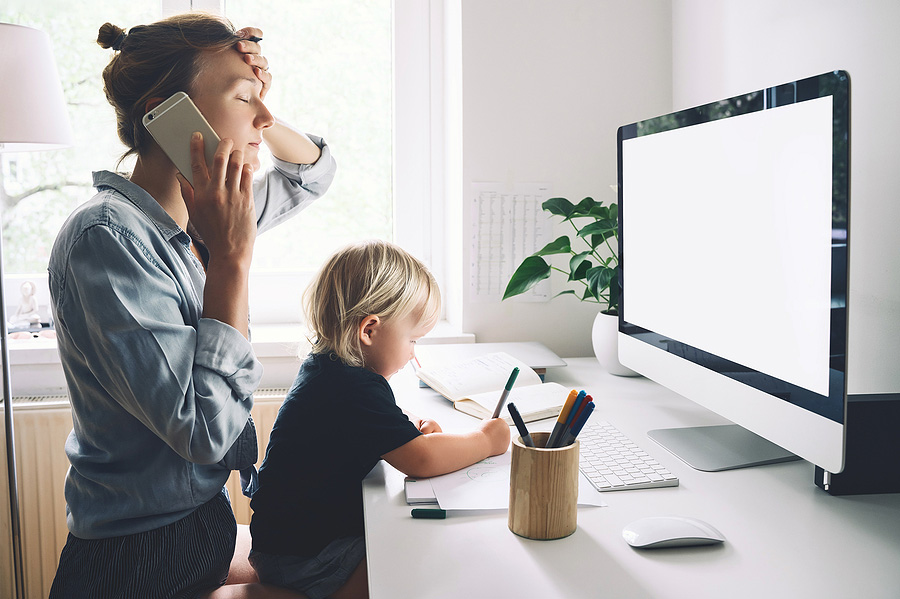How reliant are you on being connected 24/7? If you’re like many of my clients, you’ll have a hard time imagining a way that you can disconnect from email, phone, and other devices for any significant amount of time.
In the modern world, being available all the time seems to be an expectation. Work emails come in at all hours, social media is always beckoning, members of your family may send regular urgent (at least in their eyes) requests via text.
But what is all that connection doing to your stress level? Whether you realize it or not, being constantly available puts a lot of strain on your body, and can create real health problems.
Leanne came to see me recently with symptoms no one could explain.
She was exhausted, irritable, couldn’t focus, and couldn’t sleep at night. She was also experiencing chronic pain that had no clear explanation, and her GI system was really suffering. She’d had test after test but no one had any answers.
When I asked her about stress she said she’d been working on finding ways to diminish stress in her life, including reducing her work hours and saying no to some volunteering efforts, but it hadn’t made much difference.
Then I asked about technology use.
“I can’t get away from it,” she said. “I have two phones with six different apps used for work, kid’s activities, and social reminders. Something is always chiming or ringing, even late at night. It drives me crazy!”
When I asked her why she didn’t just turn everything off, she looked at me with skepticism. “I have to be available,” she said.
But why?
With the explosion of technology, we’ve forgotten that it’s okay to have down time. That just because someone is calling doesn’t mean you are required to stop what you’re doing and answer. That being available for your boss can be relegated to work hours, and being available for your family is more meaningful when devices aren’t involved.
When I have clients who are as far gone as Leanne, I often recommend a total digital detox – even for just one day! Setting technology aside temporarily can be the impetus for setting better boundaries long term.
Let’s take a look at how technology impacts stress and how a digital detox can help. Then I’ll give you some tips and strategies for maintaining control over your digital life.
What is stress?
First, let’s talk about what stress can do to your body.
Stress is anything that upsets the natural balance of your body that allows for peak performance. Your body is equipped with a stress response to help maintain that optimal balance.
This stress response is absolutely necessary when a true threat to survival is present. But, unlike for our early ancestors, we are much less at risk of actual life-threatening danger.
Very few people these days, for instance, encounter wild animals. Unfortunately, our stress response hasn’t caught on to that yet.
Your body perceives any stressor as real and present danger. Stressors trigger the stress response in your nervous system, releasing hormones that will prepare your body to run, fight, or freeze.
When this response is activated too frequently, the hormones keep flowing. This results in elevated hormone levels, particularly cortisol, in your blood. And this can lead to a host of physical and mental health concerns.
Because your body responds to all stressors equally, digital demands can really be a problem, especially when they are constant.
How does technology impact stress?
Technical devices save time, make communication easier, and allow you to stay connected with loved ones far away. But too much connection also contributes to chronic stress, and can prompt anxiety, depression, and physical symptoms that make life more difficult.
Research and surveys have each demonstrated increased stress due to technology in both adults and adolescents.
In 2017, the American Psychological Associations’ Stress in America Survey, which is conducted annually, found that 86% of respondents reported checking their devices often or constantly. The survey also showed that self-reported stress levels were higher in those who checked devices frequently, especially among those who check work email constantly, even on days off.
Forty-two percent of those constant checkers reported stress from political and cultural discussions on social media. And 65 percent of survey respondents either somewhat or strongly agreed that “unplugging” periodically would benefit their mental health. But only 28 percent said they actually did so!
Though this is just one survey, the APA considered technology related stress so important to think about, that for the first time ever they released the survey in two parts, with the second section focusing on technology.
What is it about overusing technology that creates additional physical and emotional stress?
In addition to disrupting sleep, which can lead to a wide range of physical symptoms, constant connection can upset work-life balance; hinder personal connections; lead to unfavorable comparisons between your life and the lives of others; and prompt you to constantly feel like you’re missing something.
Making it too easy for the office to reach you can lead to feeling overworked and burned out. Seeing glamorous glimpses of other people’s lives can cause your own life to feel dull or difficult. Seeing the details of other people’s social lives can leave you feeling disconnected and lonely.
All of these factors can trigger that stress response, leaving you feeling the impact of digital overdose.
A Digital Detox and When It’s Needed
While it may seem frightening to think about deliberately disconnecting, in the long term you may find yourself more connected to what really matters. There are some simple signs that could indicate it’s time to put the devices down and step away for a while.
- Being unable to find your phone causes anxiety
- You can’t stop checking your phone every few minutes
- After scrolling through social media, you feel anxious, stressed or angry
- You are up too late or rise earlier than necessary to spend time on a device, despite being exhausted
- You can’t focus on one task at a time; you keep stopping to check email, texts or social media
- You’re convinced you’ll miss something important if you don’t check your device frequently.
What exactly is a digital detox?
Any kind of detox is about removing the source of the problem.
If too much gluten makes you feel lousy, detox means eliminating it from your diet for a while to let your system rest. If chemicals in cleaning products are producing uncomfortable symptoms, you detox by finding natural substitutes to use instead.
With a digital detox, you set a time frame during which you won’t use any technological devices: smartphones, televisions, tablets, or computers. The goal, ultimately, is to focus on real interactions, slow down, and give yourself a break from the need to be constantly connected.
I can’t disconnect entirely – will cutting back help?
Ideally, a digital detox would mean extended time away from ALL devices.
I have a friend who spends a week each summer at a cabin in the woods with her family. It is extremely remote – no wifi or cell phone service, no televisions – heck, they don’t even have electricity! She tells me this annual retreat is a key to her ability to function well the rest of the year. Now that’s de-stressing!
But sometimes, a complete shutdown just isn’t practical. And some reduction in stress is better than none, so if you can’t avoid technology entirely, set realistic boundaries that you can stick to.
Even cutting back can reduce stress and increase well-being. And let’s be honest – if you’re checking your email, news sites, or social media every five minutes, you’re mostly reading the same things over and over again.
What else can I do to detox from devices?
Boundaries around how you use your devices is the best way to give yourself some tech-free time each day.
Set work hours and communicate them clearly, whether you work in an office or remotely. Within those hours, you can take it a step further and let people know you only check email at the beginning and end of the day unless your work depends on faster response time while you are working.
When you get home at night, choose a time for devices to be put aside. Try to give yourself at least an hour before you go to bed where you aren’t using devices. Instead, play a game with your family, read a book, enjoy a cup of tea, do a puzzle or another non-electronic activity.
Set time limits for yourself (one friend I have told her husband to set the parental controls on her phone – and NOT give up the passcode). Create boundaries around how you’ll handle device usage when participating in live social activities.
Give your full attention to the task at hand. If you decide you want to read for an hour, leave digital devices in another room. Don’t bring devices to the dinner table or a gathering of friends. Keep them out of the bedroom entirely if you can (get an alarm clock instead of using the phone alarm to wake you up).
Because constant sounds or scrolling banners capture your attention, making it more difficult to leave devices alone, turn notifications off. It’s overwhelming to get a new alert every time something happens in the digital world!
Create a personal digital detox to reduce stress and promote good health
As with most things, there’s no one right way to approach a digital detox. You have to do what fits into your life! But it’s clear to me that reducing use of technology can have a real benefit to both physical and mental health.
The key is to find something you can commit to – and then do it! Start small by setting one device aside for a few hours. Or go all in and put all your devices away for a few days – or head somewhere so remote they won’t work anyway.
Remember Leanne? She started by shutting off notifications and by the time she came back to see me, she was leaving her work phone off all weekend. She couldn’t believe the difference it made. She had more energy, got better sleep, and had significantly less pain to contend with! She did it – and you can too.
Only you know what’s really essential in your life. Trust me on this, though — once you try it, you’ll love the way you feel so much, you just might make not checking devices a habit that sticks!







